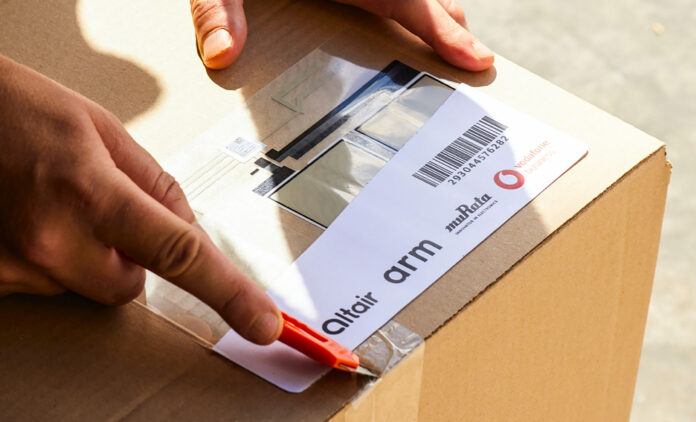Smart label pioneer Sensos, spun-off from Sony Semiconductor Israel last year, has closed a Series A funding round worth $20 million to further develop and commercialise its disposable and degradable iSIM-based cellular IoT smart label solution for asset tracking in the logistics industry. Its original prototype was used in the seminal smart label deployment at German pharmaceuticals firm Bayer, in partnership with Kigen and Vodafone, and has since been picked up by DB Schenker, the logistics division of rail operator Deutsche Bahn, plus others.
The new funding round was led by Mitsui-backed Magenta Venture Partners, joined by JAL Ventures; Israel Cargo Logistics and Sumitomo Corporation were also involved. Sensos calls the solution a “proactive supply chain management solution” that combines “environmentally-friendly disposable cellular labels and a unique AI-based control tower”. The ‘AI control tower’ is the newest part of its smart-label proposition, to collect and analyse data and issue alerts. Sensos is targeting cold-chain logistics, mission-critical shipments, and high-value goods, it said.
The smart-label market is an interesting one, and potentially hugely exciting for the IoT sector – as a lever to open the so-called massive IoT market to cellular-based technologies. The original smart label solution from Sensos, when it was a project group within Sony Semiconductor, started in 2019/20, and developed with SIM specialist Kigen, module maker Murata, and mobile operator Vodafone. The trio produced an printable NB-IoT tracking device for Bayer, originally, with a battery, microprocessor, antenna, modem, plus a couple of sensors.
The battery is alkaline, rather than lithium-based, and so “dissolvable”; the same for the other printed components, bar the chip, which can be retrieved. The label was supposed to cost a couple of euros, only. The group has been looking into using biodegradable plastics, made from fish scales, for the substrate. Bayer has been in an extended commercial trial with the technology, attached to agricultural shipments. Since then, DB Schenker has taken the smart-label solution from Sensos (and possibly Vodafone) to track small freight consignments globally.
But the Senos experiment with Bayer is not the only smart-label game in town. Dutch IoT hardware firm SODAQ has a similar collaboration with Germany-based IoT MVNO Pod Group, part of security tech group Giesecke+Devrient (G+D), to deploy an LTE-M based smart label with system integrator Lufthansa Industry Solutions (LHIND). AT CES last year, they called it the “first commercial smart label” device. It features a low-power LTE-M transceiver, a 3D-printed alkaline battery, and temperature and motion sensors. The whole package is recyclable, they claim.
In parallel, the IoT market has been pushing parallel innovation with energy-harvesting technologies to do away with batteries altogether in low-power IoT units. ABI Research predicted last year that energy harvesting IoT solutions will gain commercial traction, but that printed electronics will remain a work-in-progress. Before Christmas, there was a committee vote at a 3GPP meeting to decide whether ‘ambient’ IoT, to enable energy-harvesting in battery-less cellular devices, should be included as a work item in development of the Release 19 of the 5G NR standard.
Meanwhile, France-based startup Dracula Technologies, offering low-light energy-harvesting for passive (battery-less) LoRaWAN connectivity, has a prototype tracker that runs on an organic photovoltaic (OPV) solar cell, and a brand new factory to ramp up production, and Scandinavian duo ONiO and Epishine have a deal to “bring to life a shared vision of self-powered IoT devices” based on a combination of the former’s battery-less microcontrollers and the latter’s printed solar cells.
But the smart label remains a major innovation story, and Sensos is one of its chief authors, so far. The firm said the IoT tracking industry, as an adjunct of the logistics sector as a whole, remains “fragmented” – “relying on partial digital solutions, poor data quality, and error-prone manual labour,” it said, leading to supply-chain inefficiencies and waste. It stated: “This increases operating costs by requiring companies to keep larger inventory and apply wider production margins, heavily impacting their bottom line and affecting the environment.”
Its smart-label business was formed to address this, and the new $20 million investment will be used to see it through, it said. Aviv Castro, chief executive at Sensos, said: “This investment… is a clear vote of confidence in the team and in the solution, solving the lack of actionable data and the need for optimized execution in today’s logistics market. By using the Sensos solution, companies can optimize production planning, inventory levels, and shipping efficiency and at the same time monitor and reduce greenhouse gas emissions meeting ESG regulations.”
Ori Israely, managing general partner at Magenta Venture Partners, commented: “Accelerated by Covid-19 and geo-political pressures, supply chain, and logistics grow in scale and complexity – yet suffer from lack of real-time actionable data. We see a growing need for solutions that enable greater supply chain accountability and agility. Sensos’ vision goes beyond anyone else in the market today, with a team that is well immersed in the world of logistics and ready to face this global challenge.”
Amiram Levineberg, general partner at JAL Ventures, added: “In a world where seamless connectivity drives innovation, Sensos emerges as a beacon of efficiency in supply chain management. With a team rooted in the world of wireless communication, they’re uniquely positioned to revolutionise how data flows through logistics networks.”

